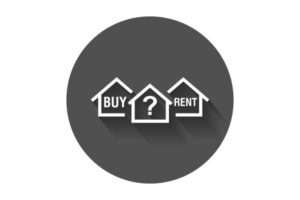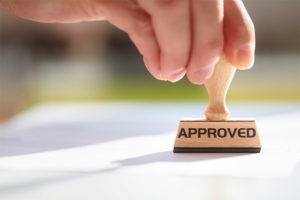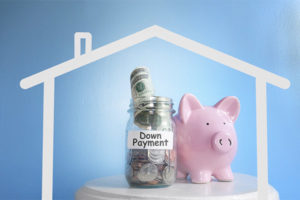Home »
Owning a home was part of the American dream even before there was an America. It’s true. In the tumultuous years leading to the Revolution, the Founders frequently associated acquiring and holding property as fundamental to our inalienable rights to life, liberty, and the pursuit of happiness.
In short, the American yearning for a place to call our own is in our DNA.
Nurturing that desire underpins many of the homeowner-friendly policies adopted and long protected by Congress, from providing tax deductions for mortgage interest and property taxes to the subsidizing of home purchases through assorted federal programs that shrink (and can even obliterate) the most onerous obstacle to homeownership: the down payment.
Whether those programs are right for you is a question we’ll visit below. For now, let’s examine the nuts and bolts of the foremost consideration standing between you and the keys to your first home – coming up with a down payment.
Conventional wisdom demands that you have 20% of the cost of the house for a down payment, but reality states that, given the right situation, you could get in the door with as little as 3% or maybe even 0% down! Let’s take a closer look and see where you fall.
What Is a Down Payment?
A down payment is, usually, a sum of cash applied to the purchase price of an expensive item — a car, a house, or some other pricy commodity or service — that reduces the balance to be paid off over time.
Generally, a down payment represents a percentage of the entire purchase price. In some cases, a down payment is not refundable if the purchaser fails to complete the deal; if you are entering into a purchase that involves a down payment, know the details before you sign any documents.
Usually, buyers arrange financing to cover the balance of the amount owed the seller. When the purchase involves a house, the homebuyer most often relies on a bank or some other financial institution to pay the balance through the establishment of a mortgage loan, which is satisfied through a series of installment payments.
Benefits of a down payment include:
- Reducing the amount of interest paid during the time the homeowner pays on the loan;
- Lowering the monthly payment;
- Providing lenders a certain amount of security. The larger the down payment, the greater that sense of security, which, as we shall see, can accrue to the benefit of the borrower.
What is the Minimum Down Payment?
You will hear that the minimum down payment always involves a double-digit percentage of the total purchase price, the higher the better. Ten. Fifteen. Twenty percent.
Actually, the minimum down payment is a moving target, depending upon the borrower and/or the type of loan. Some borrowers can score the keys to a new dwelling with zero down payment. (We’ll get into that in a moment.) Some loans require comparatively modest down payments, 3 to 5%.
A 2017 survey by the National Association of Realtors put the average down payment at 10%, with first-time buyers putting down just 5%.
There are ramifications to all down-payment decisions. A smaller down payment means a higher monthly payment, for several reasons.
- Simple math, for openers. A lower down payment means a larger loan balance to pay back over, presumably, the same 15 or 30-year time period.
- Higher interest rates, because the lender will be taking a larger risk.
- You’ll have to pay private mortgage insurance, or PMI.
All of that constitutes why 20% is widely regarded as the ideal minimum down payment. It’s certainly a benchmark. Get there and you will a) owe less; b) receive the best interest rate; and c) not have to PMI.
All things being equal — credit scores, work history, paychecks — a larger down payment means the lender is taking less risk: If the going gets tough, you’re less likely to walk away from a big personal stake in the house; and even if you do, the lender is less likely to be stuck with a property that’s worth less than what is owed.
A 20% down payment means you avoid PMI, a policy that guarantees your loan if you stop paying. PMI premiums can be pricy — about 1% of the loan each year on a conventional loan — and they’re tacked onto your mortgage payments.
A word about that: If you get stuck with PMI, keep track of your home’s market value. No matter how much you put down, once your equity — the market value of your house vs. how much you owe on your mortgage — surges past 20%, you can require your lender to cancel your PMI.
The downside of a big down payment is you’ll be tying up a large chunk of money — $40,000 on a $200,000 house — that can’t be easily accessed if you need cash in a hurry and haven’t built up an emergency fund.
There’s also a slender chance you never see that money again. If hard times hit, property values plummet and you suffer a foreclosure, for instance. Or if you have to sell the place for substantially less than you paid.
Can I Buy a House with No Down Payment?
Veterans and borrowers buying through a U.S. Department of Agriculture program that encourages rural homeownership can get into a house with zero down payments and, typically, no PMI.
Zero-down, government-backed loans can be useful, especially for that first home purchase. And, heaven knows, our veterans, reservists and active-duty military personnel deserve the perk. Who wouldn’t want a mortgage with no top-end limit, no minimum credit score, no PMI, lower interest rate, and limited closing costs?
Still, downsides apply.
Just getting into a Veterans Administration-backed loan can be a hassle. The program’s reputation for red tape and prolonged appraisal period is legendary. Between 2012-2016, the Consumer Financial Protection Bureau fielded more than 12,500 complaints from military families.
Zero-down, government-backed loans can be useful, especially for that first home purchase.
Usually, a VA guarantee comes with a funding fee — a percentage of the home price — that covers operating costs. The lower the down payment, the higher the funding fee. First-time users with regular military backgrounds applying for a zero-down loan are hit with a 2.15% fee; similar borrowers with reserve or National Guard histories pay 2.4%.
The problem for zero-down VA borrowers is clear: They will emerge from closing with a house that is worth less than the mortgage.
Additionally, the lender may add conditions to the loan, including a minimum credit score, a maximum debt-to-income ratio, a minimum loan amount, and restrictions on the type of property, such as co-ops or manufactured homes.
Nonetheless, the benefits of a VA-guaranteed mortgage can easily outweigh its drawbacks. Those eligible owe it to themselves at least to give it a look.
Also, as we get further from the 2008 crash and lenders become more creative, other zero-down products are hitting the market, but beware: such inventive zero-down loans may come with fat fees and high interest rates; involve piggyback loans (a market-rate first mortgage, plus a high-rate second mortgage used for the down payment); or lender “grants” the borrower pays back as part of his mortgage.
First-time buyers who can scrape together a down payment amounting to 3.5% of the purchase price may qualify for mortgages backed by the Federal Housing Administration, or FHA. Such buyers pay a heftier PMI premium (1.75% of the purchase price annually), but the low, low down payment allows buyers into the market who might otherwise be shut out.
Generally, FHA 3.5% down mortgages are capped at $417,000, although high-end markets such as New York or Silicon Valley see much higher ceilings.
It’s also possible to land a conventional bank loan with as little as 5% down, although the $417,000 cap usually applies.
How Can I Save for a Down Payment?
As with most things involving money anymore, unconventional methods are being applied to the onerous task of raising down payment cash. Crowdfunding. Yep. Or agreeing to list a spare bedroom with Airbnb and funneling most of that income over a specified period to an investor who fronts the down payment.
There’s even a growing business in the field of shared equity: In exchange for a piece of the appreciation in a dwelling’s value when it is sold, investors such as San Francisco-based Unison will provide up to half a homebuyer’s down payment. (If there’s a loss, Unison absorbs a portion of that as well.)
While generous parents or other kin who are well off are a regular, if not exactly routine, source of down payment assistance, the traditional method of budgeting, discipline and self-denial remains the surest path to success.
That’s right. Doing it the hard way.
Open a savings account in the bank or credit union where you do your checking. That way you can more easily transfer funds between accounts online. Establish a budget. Be tough on your spending; the sooner you eliminate nonessentials, the sooner you’ll be mowing the lawn on that sweet 4-2 Cape Cod on a corner lot.
Now, whatever money is left over, have that amount (or most of it) automatically deposited by your employer in your savings.
Any windfalls that come your way — tax refunds, bonuses, cash gifts at birthdays, Christmas, or other special occasions — go into your down payment savings.
Got a little time in your schedule? The gig economy is a sure way to beef up your income and savings. Drive for Uber or Lyft. Deliver groceries with a service such as instacart. If you have marketable expertise, look into freelancing opportunities.
While you’re at it, stoke your emergency fund. Having at least six months of living expenses socked away is astonishingly liberating.
Finally, if you’re a first-time buyer (which can include someone who has not owned a dwelling in the last three years, or doesn’t own as a result of divorce), look into first-time buyer programs in your city. Some offer grants that don’t need to be repaid; others offer interest reductions and/or tax benefits. Live in Florida? Find out about Florida Down payment Assistance Programs.
What Other Upfront Costs Will I Have to Cover?
You’re not going to like this. Closing costs — fees, taxes, insurance (homeowners and title), homeowners association transfer payments, inspections, appraisals and more — typically run between 2% and 5% of the purchase price, or $4,000-$10,000 on our $200,000 house.
Closing costs are negotiable, so you should shop for a mortgage that is the best blend of interest rate, duration, and closing costs.
When the lender’s Loan Estimate arrives, usually three days before closing, study it for surprises or overcharges (such as high administrative, mailing or courier fees). If something seems amiss, tell the lender.
How Much Home Can I Buy with $10,000 in the Bank?
How much house you can buy is a function of many variables, including — but not limited to — your credit score, your income, your debt-to-income ratio, the housing market where you’re looking, and the loan-to-value amount of the house you’d like to buy.
Assuming you’re neither a veteran nor someone pursuing a USDA loan, you’ll maximize your home buying potential with $10,000 by qualifying for an FHA loan. Not only will you need only a 3.5% down payment, but FHA financing allows you to get the seller to kick in with some of the closing costs.
With $10,000 saved — and assuming your household income can swing the monthly payments — you could be looking at houses in the ballpark of $165,000: $5,775 down, with $4,225 remaining for closing costs.
How Much Money Should I Have at Closing?
Beyond the out-of-pocket expenses you’ll bring to the title company’s table, you’ll want some backup.
Remember above when we recommended six months of living expenses? You’re going to like having that emergency fund when, after six weeks, the refrigerator shuts down and you can’t call the landlord to fix it. You’re your landlord now, with all the rights and benefits and — yes — responsibilities that entails.
It’s the American dream, after all. And you’re worth it.
Sources
Barnett, R. (2017, July 4). What the Declaration of Independence Said and Meant. Retrieved from https://www.washingtonpost.com/news/volokh-conspiracy/wp/2017/07/04/what-the-declaration-of-independence-said-and-meant/?utm_term=.8ed18902075d
NA (NA). Definition of “Down Payment.” Retrieved from https://www.investopedia.com/terms/d/down_payment.asp
Pritchard, J. (2018, Oct. 10). Down Payments: How They Work, How Much to Pay. Retrieved from https://www.thebalance.com/choosing-a-down-payment-315602
Moneywise (2018, June 7). How Much Should You Put Down When You Buy a House? Retrieved from https://moneywise.com/a/how-much-to-put-down-on-a-house
Consumer Reports (2018, April 12) Here’s How Much Mortgage You Can Actually Afford. Retrieved from https://www.consumerreports.org/mortgages/how-much-mortgage-can-you-afford/
Moneywise (2018, Aug. 6). A Homebuyer’s Guide to PMI: Private Mortgage Insurance. Retrieved from https://moneywise.com/a/homebuyers-guide-to-pmi
O’Connell, B. (2018, Aug. 17). How Much is a Down Payment on a House? Do You Need 20 Percent? Retrieved from https://www.thestreet.com/personal-finance/real-estate/down-payment-on-house-14686280
Chodorov Kaminsky, J. (2018, Feb. 19). Zero-down home loans are back. Be very leery. Retrieved from https://www.washingtonpost.com/news/where-we-live/wp/2018/02/12/zero-down-home-loans-are-back-be-very-leery/?noredirect=on&utm_term=.6fd201e10bd8
Wiser Advisor (2017, Feb. 6). First-Time Home-Buyers: How Much Do You Really Need to Save? Retrieved from https://www.fool.com/mortgages/first-time-home-buyers-how-much-do-you-really-need.aspx
Siegel Bernard, T. (2018, June 1). Getting Down Payment Help Now. Sharing Home’s Gain (or Loss) Later. Retrieved from https://www.nytimes.com/2018/06/01/your-money/home-buying-shared-equity.html
Miller, P. (2018, March 21). How to Save for a House Down Payment. Retrieved from https://www.thesimpledollar.com/buying-a-house-how-to-save-for-a-down-payment/
Mercadante, K. (2017, Jan. 26). How To Best Save For A Down Payment On A House. Retrieved from https://www.moneyunder30.com/save-downpayment-house
Zillow (NA). What Are Closing Costs and How Much Are They? Retrieved from https://www.zillow.com/mortgage-learning/closing-costs/
HUD-Approved Online Homebuyer Education Course
HomeTrek is an easy-to-use HUD-approved online homebuyer education course. Our course will help you learn budgeting, saving, how to improve your credit, understand home much home you can afford.
















